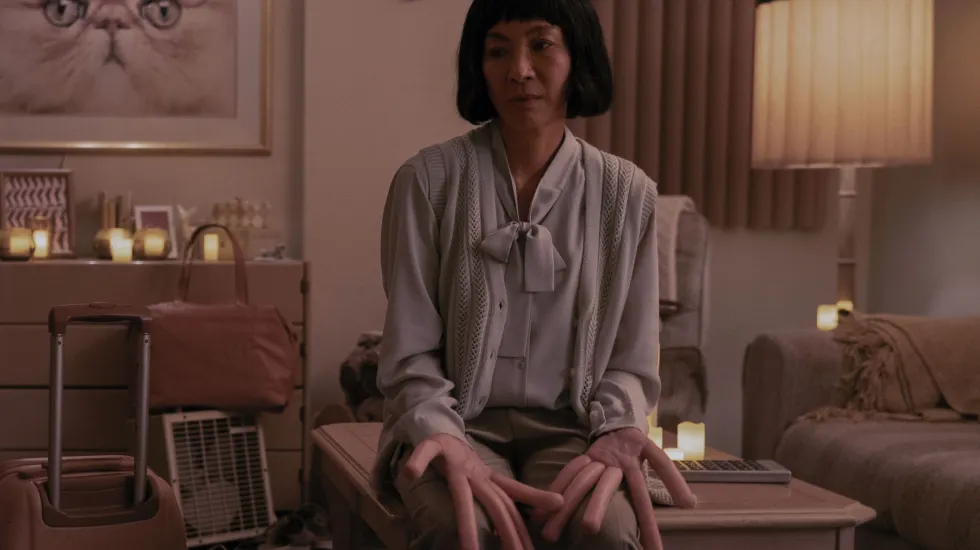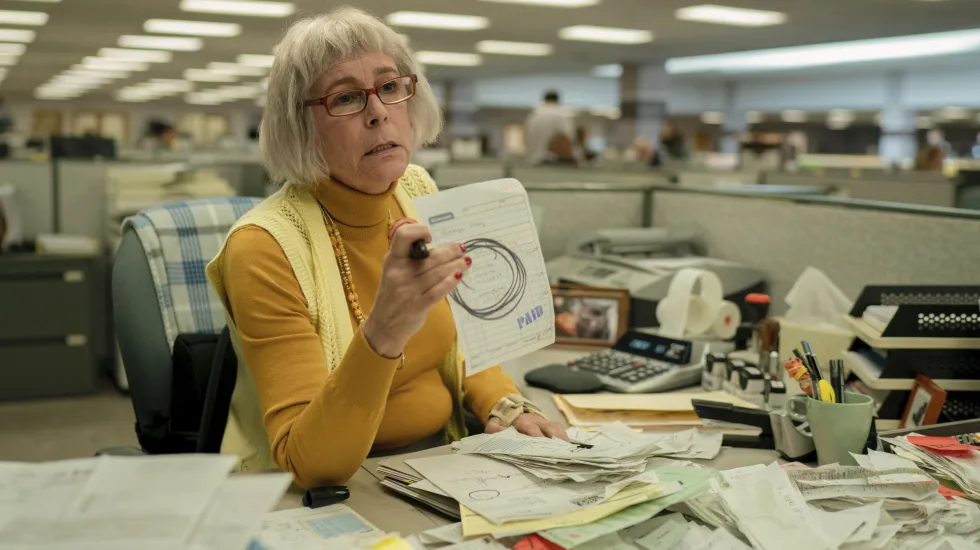
“Everything Everywhere All at Once” is your standard multiverse martial arts movie about filing your taxes and midlife regret in which googly eyes, everything bagels and fanny packs play vital supporting roles and portals to parallel existences are opened not with a spell but with butt plugs and paper cuts.
The movie is by Daniel Kwan and Daniel Scheinert, the filmmaking duo known as the “the Daniels,” whose first film, the buddy movie “Swiss Army Man,” co-starred Daniel Radcliffe as a very flatulent corpse.
“Everything Everywhere All at Once,” though, is more ambitious. It’s possible that the distance has never before been so great between a movie’s mundane storyline — in this case, a Chinese immigrant laundromat owner trying to file her taxes — and what extreme shape it takes. Rarely has a trip to the IRS yielded such cosmic, metaphysical digressions as it does in “Everything Everywhere All at Once,” an antic, anarchic and yet affecting movie with the spin cycle set to supercollider.
A24 presents a film written and directed by Daniel Kwan and Daniel Scheinert. Rated R (for some violence, sexual material and language). Running time: 139 minutes. Screens Wednesday in IMAX at Regal City North and opens Thursday at local theaters.
“The universe is so much bigger than you realize,” says Joy (Stephanie Hsu), daughter of Evelyn Wang (Michelle Yeoh), at one point in the film.
And though “Everything Everywhere All at Once” (a movie that very much lives up to its title) can verge on overload, it’s this liberating sense of limitless possibility that the movie leaves you filled with, both in its freewheeling anything-goes playfulness and in its surprisingly tender portrait of existential despair. Quite an accomplishment for a film that hinges on properly formatted tax receipts.
In the movie’s chaotic first moments, Evelyn is balancing piles of paperwork in the apartment she shares with her kind but naive husband Waymond (Ke Huy Quan, the actor famous for playing as a kid Short Round in “Indiana Jones and the Temple of Doom” and Data in “The Goonies”) ahead of the impending visit of her disapproving father (James Hong, now 93 but no less animated), while attending to the needs of customers in the laundromat downstairs. At the same time, Joy is introducing her girlfriend, a label that Evelyn doesn’t want her father to hear. Their fraught relationship is even clearer when Evelyn chases down Joy in the parking lot for what seems intended to be a warmer exchange. Instead, she blurts out that Joy needs to eat less.

The dissatisfaction, we immediately grasp, is really Evelyn’s own. Divorce papers are circulating. Yeoh, extraordinary here, plays Evelyn as frustrated and disoriented, bitter that her life has turned out to be a circle of laundry and taxes. Something has gone terribly wrong. When she, Waymond and her dad go to visit the IRS auditor (Jamie Lee Curtis), their humdrum reality starts to cleave in ways that will scrutinize the choices Evelyn has made leading to this scattered moment.
There at the IRS, while Evelyn is half-listening to how she might lose her business, a metaverse intrudes. A more capable version of Waymond hailing from another dimension (the “alpha verse”) takes her aside to warn of a new evil that is tearing through the many levels of existence that, he explains, were all created by each decision Evelyn has ever made. Spider-Man fused planes of roughly similar superhero realms, but Evelyn’s multiverse is an infinite matrix of what might have been.
It’s possible that I’m making “Everything Everywhere All at Once” sound clearer than it actually comes across. These things get explained but the pace is never not hectic. And while most science-fiction films belabor the rules that govern such splintered worlds, the Daniels’ film simply takes what’s at hand to make its verse-jumping. It’s an absurdist Charlie Kaufman-esque series of worlds that connect Evelyn with other versions of how her life might have turned out, for example, if she didn’t marry Waymond. In one, Evelyn is a famous movie star — essentially Yeoh, herself — with footage from her actual “Crazy Rich Asians” premieres. In another, silkily styled after Wong Kar-Wai’s “In the Mood for Love,” she and Waymond encounter each other later in life.
But plenty of the alternate realities are gleefully ridiculous. In one, people evolve with hot dogs for fingers, leaving them to play Chopin with their feet. Another is a wild riff on “Ratatouille,” only, thanks to Evelyn’s mispronunciation, it’s with a raccoon for a tiny chef.
As boundless as “Everything Everywhere All at Once” is, it’s a fairly claustrophobic movie — the multiverses mostly collide in Evelyn’s present reality. No matter what timeline it’s flittering through, it’s really set within the psychology of Evelyn and Joy. It’s a proxy version of the daughter that’s causing all the trouble in the various universes. And as absurd as things get, the movie is impressively focused on working out the deep-seated pains and pangs of insignificance that are fueling all the havoc. The performances, somehow, are grounded throughout. There’s not a weak link in the cast but it’s a special joy to see — and hear — Quan again. His abiding sweetness may be the movie’s deepest reservoir of feeling.
The frantically edited filmmaking isn’t always polished but it’s not always meant to be, either. There are echoes of movies like “Kung Fu Hustle” and the chaotic irreverence shares some DNA with the same plate-spinning movies of Phil Lord and Chris Miller. But “Everything Everywhere All at Once,” about one woman struggling to make sense of her small and disordered life, is emphatically its own thing. Next to grander and glossier metaverses, and more tidily sensible movies, “Everything Everywhere” stands as an antidote to algorithm. It’s a preposterous and tasteless ode to the messy, nonsensical struggle and bliss of being human.







